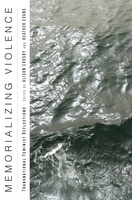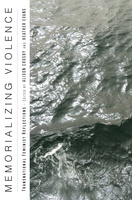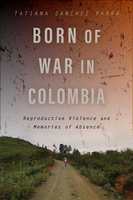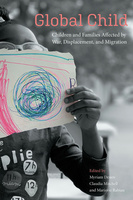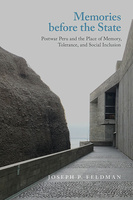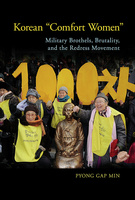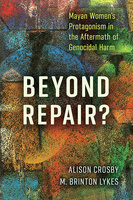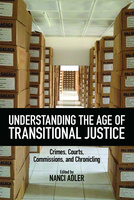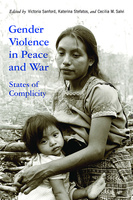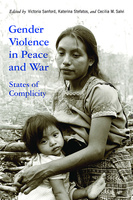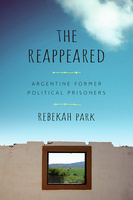Memorializing Violence
Transnational Feminist Reflections
This volume brings together feminist reflections on the transnational lives of memorializations to colonial, imperial, militarized, and state violence. It asks what’s at stake in memorializing amidst and against ongoing harm and injustice produced by white supremacist global capitalist empire.
Memorializing Violence
Transnational Feminist Reflections
This volume brings together feminist reflections on the transnational lives of memorializations to colonial, imperial, militarized, and state violence. It asks what’s at stake in memorializing amidst and against ongoing harm and injustice produced by white supremacist global capitalist empire.
Lifting the Shadow
Reshaping Memory, Race, and Slavery in U.S. Museums
Lifting the Shadow examines how the National Museum of African American History and Culture, Montgomery’s Legacy Museum and Tulsa’s Greenwood Rising are challenging the national narrative on slavery and race by placing racial oppression at the center of American history and linking historical slavery to contemporary racial injustice.
Genocide Studies
Pathways Ahead
In recent years, the world has been shaken by numerous events that have caused and continue to cause massive human suffering, from the COVID-19 pandemic to intrastate and interstate armed conflicts. These crises confound definition and label, but now is the time to think about current manifestations of genocide and those likely to emerge in the future
Genocide Studies
Pathways Ahead
In recent years, the world has been shaken by numerous events that have caused and continue to cause massive human suffering, from the COVID-19 pandemic to intrastate and interstate armed conflicts. These crises confound definition and label, but now is the time to think about current manifestations of genocide and those likely to emerge in the future
The United States and the Armenian Genocide
History, Memory, Politics
This is the first book to examine how and why the United States refused to officially acknowledge the 1915-17 Armenian Genocide until the early 2020s. Drawing from congressional records, rare newspapers, and interviews with lobbyists and decision-makers, historian Julien Zarifian reveals how genocide recognition became such a complex, politically sensitive issue.
Born of War in Colombia
Reproductive Violence and Memories of Absence
Born of War in Colombia examines how a past-oriented and harm-centered model of transitional justice has converged with a restricted notion of gendered victimhood and the patriarchal politics of reproduction to render the bodies of people born of conflict-related sexual violence unintelligible to those seeking to understand and address the consequences of war in Colombia.
Destroy Them Gradually
Displacement as Atrocity
Destroy Them Gradually reframes forced displacement as an annihilatory process, rather than as an event that precedes an atrocity. Displacement crimes are defined as the unique fusion of forced displacement with systemic deprivations of vital daily needs to destroy populations.
Being Human
Political Modernity and Hospitality in Kurdistan-Iraq
Being Human: Political Modernity and Hospitality in Kurdistan-Iraq is a unique work of anthropological hospitality that draws on historical sources, eyewitness testimonies, perpetrator testimony, archival documents, trial records, artwork, novels, and poetry, to engage with one of political modernity’s acts of genocide in Iraq under the Iraqi Baʿth state.
Global Child
Children and Families Affected by War, Displacement, and Migration
The Politics of Genocide
From the Genocide Convention to the Responsibility to Protect
Resonant Violence
Affect, Memory, and Activism in Post-Genocide Societies
Resonant Violence explores both the enduring impacts of genocidal violence and the varied ways in which states and grassroots collectives respond to and transform this violence through memory practices and grassroots activism. By calling upon lessons from Germany, Poland, Argentina, and the Indigenous United States, Resonant Violence demonstrates how ordinary individuals come together to engage with a violent past to pave the way for a less violent future.
From Bureaucracy to Bullets
Extreme Domicide and the Right to Home
Memories before the State
Postwar Peru and the Place of Memory, Tolerance, and Social Inclusion
Korean "Comfort Women"
Military Brothels, Brutality, and the Redress Movement
Arguably the most brutal crime committed by the Japanese military during the Asia-Pacific war was the forced mobilization of 50,000 to 200,000 Asian women to military brothels to sexually serve Japanese soldiers. Korean “Comfort Women” explores Korean comfort women’s brutal experiences and their residual marriage, family, economic, and healthcare problems. It also examines the transnational redress movement, demonstrating that the Japanese government has tried to conceal the crime of sexual slavery by resolving the issue with money alone.
The Complexity of Evil
Perpetration and Genocide
Acts of Repair
Justice, Truth, and the Politics of Memory in Argentina
Acts of Repair explores how ordinary people grapple with decades of political violence and genocide in Argentina--a history that includes the Holocaust, the political repression of the 1976-1983 dictatorship, and the 1994 AMIA bombing.

